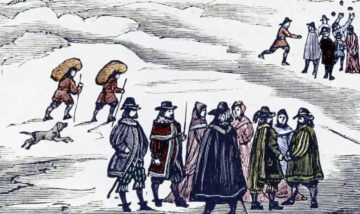Michael Marshall in The Guardian:
 In early February 1814, an elephant walked across the surface of the Thames near Blackfriars Bridge in London. The stunt was performed during the frost fair, when temperatures were so cold that for four days the top layers of the river froze solid. Londoners promptly held a festival, complete with what we might now call pop-up shops and a lot of unlicensed alcohol.
In early February 1814, an elephant walked across the surface of the Thames near Blackfriars Bridge in London. The stunt was performed during the frost fair, when temperatures were so cold that for four days the top layers of the river froze solid. Londoners promptly held a festival, complete with what we might now call pop-up shops and a lot of unlicensed alcohol.
Nobody could have known it at the time, but this was the last of the Thames frost fairs. They had taken place every few decades, at wildly irregular intervals, for several centuries. One of the most celebrated fairs took place during the Great Frost of 1683-84 and saw the birth of Chipperfield’s Circus. But the river in central London has not frozen over since 1814.
The frost fairs are perhaps the most emblematic consequences of the “little ice age”, a period of chilly weather that lasted for several centuries. But while Londoners partied on the ice, other communities faced crop failures and other threats. The story of the little ice age is one of societies forced to adapt to changing conditions or perish.
It’s also a long-standing mystery. Why did the climate cool and why did it stay that way for centuries?
More here.
